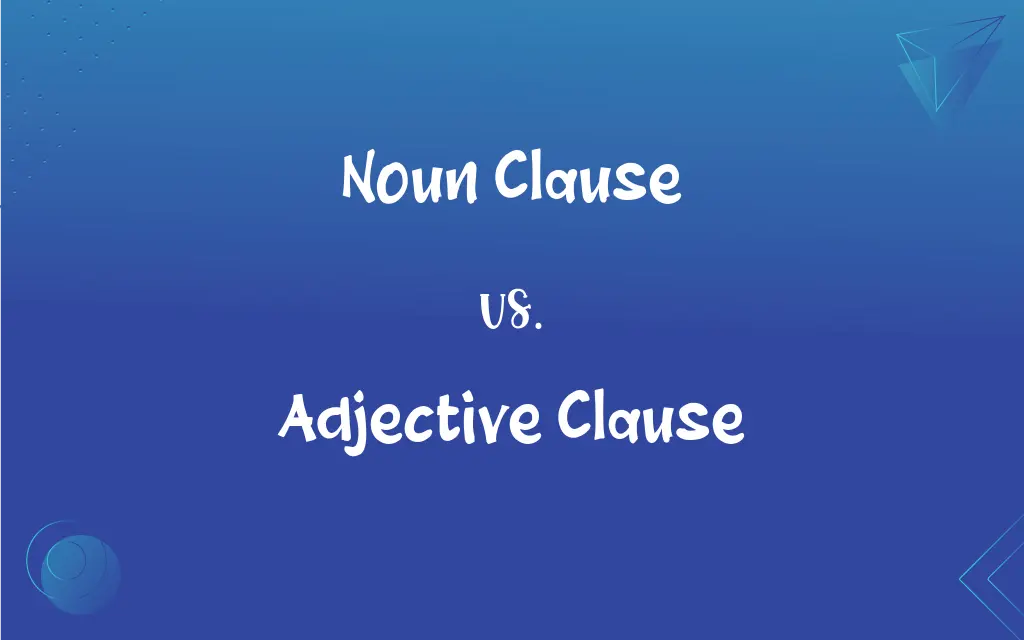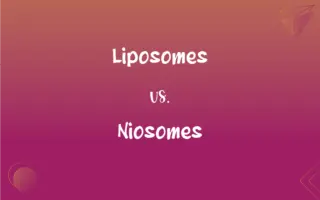Noun Clause vs. Adjective Clause: What's the Difference?
Edited by Aimie Carlson || By Harlon Moss || Published on January 16, 2024
A noun clause functions as a noun within a sentence, while an adjective clause modifies a noun or pronoun and usually begins with a relative pronoun.

Key Differences
A noun clause is a group of words that acts as a noun in a sentence. It can be a subject, object, or complement within the sentence. In contrast, an adjective clause, also known as a relative clause, modifies a noun or pronoun by providing more information about it.
Noun clauses often start with words like "that," "what," "who," "whom," "how," or "why." They can state something directly or ask a question indirectly. Adjective clauses usually begin with relative pronouns like "who," "whom," "whose," "which," or "that," and they directly modify a noun or pronoun in a sentence.
In terms of function, noun clauses can replace any noun in a sentence, such as the subject or object. For example, in the sentence "What she said was surprising," "what she said" is a noun clause serving as the subject. Adjective clauses, however, specifically describe or give information about a noun, as in "The book, which was on the table, is mine," where "which was on the table" modifies "book."
Noun clauses can stand alone as a response to a question, conveying a complete idea. For instance, in response to "What did he say?" a noun clause answer might be "That he was leaving." On the other hand, adjective clauses cannot stand alone and always need to be attached to a main clause to make sense.
Noun clauses and adjective clauses play different roles in a sentence. Noun clauses act as nouns, while adjective clauses function as modifiers to nouns, each adding depth and complexity to the structure of sentences.
ADVERTISEMENT
Comparison Chart
Function
Acts as a noun (subject, object, complement)
Modifies a noun or pronoun
Common Starters
"that," "what," "who," "why," "how"
"who," "whom," "whose," "which," "that"
Example Role in Sentence
"What she did was amazing" (subject)
"The man who called yesterday is my uncle" (modifier)
Standalone Ability
Can stand alone as a response or idea
Cannot stand alone, depends on the main clause
Additional Information
Can ask questions indirectly, express statements
Provides descriptive or specific details about a noun
ADVERTISEMENT
Noun Clause and Adjective Clause Definitions
Noun Clause
It can function as the subject of a sentence.
What she wants is unclear.
Adjective Clause
An adjective clause is always connected to the main clause.
Students who study hard get good grades.
Noun Clause
A noun clause is a group of words acting as a noun in a sentence.
That he knows the truth is evident.
Adjective Clause
An adjective clause is a group of words that modifies a noun or pronoun.
The car, which is red, is fast.
Noun Clause
Noun clauses often start with words like "that," "who," or "what."
I wonder why he left so early.
Adjective Clause
It usually starts with a relative pronoun like "who" or "which."
The person who called you is my friend.
Noun Clause
A noun clause can serve as the object of a verb.
She didn't know what he would say.
Adjective Clause
It can specify or clarify a noun in the main clause.
The house, which was built in 1920, is for sale.
Noun Clause
It can also act as the complement of a subject.
The fact is that he was late.
Adjective Clause
Adjective clauses provide more information about a noun.
The book that you gave me is interesting.
FAQs
Can a noun clause be a sentence's subject?
Yes, it can function as the subject.
Does an adjective clause always use a relative pronoun?
Usually, it starts with relative pronouns like "who" or "which."
What's an example of a noun clause as an object?
"She knows what he did."
Can an adjective clause be removed without changing the sentence's meaning?
It can be removed, but it will reduce the descriptive detail.
How do adjective clauses add to a sentence?
They provide additional information about a noun.
Do adjective clauses change the basic structure of a sentence?
No, they add detail but don't change the basic structure.
Can adjective clauses be essential to the sentence's meaning?
Yes, they can be essential for clarity or detail.
What happens if you remove an adjective clause?
The sentence loses some descriptive detail.
What is an adjective clause?
A group of words that modifies a noun or pronoun.
Are noun clauses always dependent clauses?
Yes, they cannot stand alone as a complete sentence.
What is a noun clause?
A group of words acting as a noun in a sentence.
Can a noun clause act as a complement?
Yes, it can complement a subject or object.
Can noun clauses start with "if" or "whether"?
Yes, they can introduce conditions or alternatives.
Do noun clauses always contain a verb?
Yes, they include a subject and a verb.
Can adjective clauses modify pronouns?
Yes, they can modify both nouns and pronouns.
What are some common starters for noun clauses?
"That," "who," "what," "how," "why."
What distinguishes adjective clauses in complex sentences?
They add descriptive detail to the noun in the main clause.
How is a noun clause different from a main clause?
It functions as a noun, whereas a main clause can stand alone.
Are adjective clauses always close to the noun they modify?
Typically, they directly follow the noun they modify.
How do you identify a noun clause?
Look for a clause acting as a noun (subject, object, complement).
About Author
Written by
Harlon MossHarlon is a seasoned quality moderator and accomplished content writer for Difference Wiki. An alumnus of the prestigious University of California, he earned his degree in Computer Science. Leveraging his academic background, Harlon brings a meticulous and informed perspective to his work, ensuring content accuracy and excellence.
Edited by
Aimie CarlsonAimie Carlson, holding a master's degree in English literature, is a fervent English language enthusiast. She lends her writing talents to Difference Wiki, a prominent website that specializes in comparisons, offering readers insightful analyses that both captivate and inform.































































